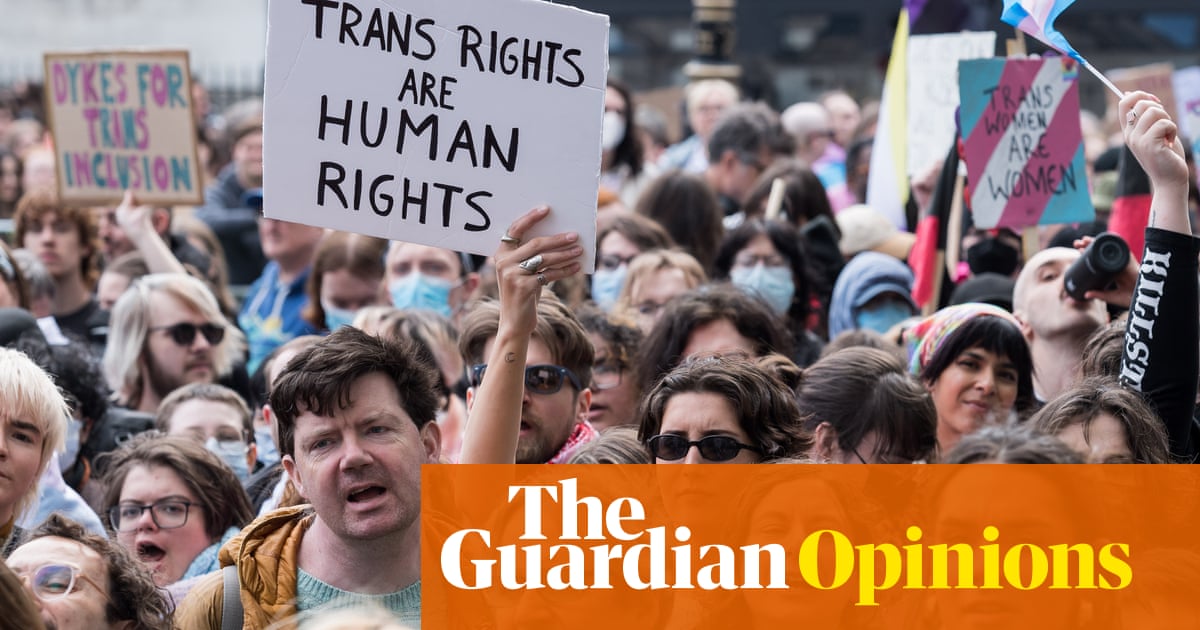Another morning, another absolutely bananas conversation about transgender people, without any trans people involved, following the supreme court ruling that permits the exclusion from single-sex spaces of anyone not born into that sex. On BBC Radio 4’s Today programme, Emma Barnett was asking care minister Stephen Kinnock about wards in hospitals, and came out with the immortal line: “Do you think it’s right for trans people to be segregated from other patients, as an interim measure, or for the future?”
Great save, that “for the future” – because if you’re going to interpret this ruling as a requirement to exclude trans people, what does that mean in practice? Trans women on men’s wards, trans men on women’s wards? This delivers dignity and respect to precisely no one; so, sure, “segregate” away, and it would have to be for ever, because it would otherwise be an interim measure on the way to what? The relentless demonisation of trans people has led us straight to a place where every choice is impossible, using words that recall, or should recall, the darkest days of prejudice and hatred.
I’ve spent the best part of 2025 in and out of various hospitals in London, and I have some observations that in a sane world would give a little texture to this debate, but in the world we’re in are just waved away, because of course it’s more important to focus on harassing the small number of trans hospital admissions there are, and ignore a wider system that’s in crisis. There isn’t a single NH hospital in the UK that could afford a separate trans-only wing, but that’s just the tip of the iceberg of things they can’t afford.
My mum spent some weeks admitted in south and west London, and, in any six-bed, single-sex ward, a minimum of four people had dementia or, at the very least, had been so discombobulated by infection and unfamiliarity that they lacked capacity. Never mind what you would make of a trans man in the bed next to you, following the supreme court decision; nobody in any ward needs to be dragged into a hot-button issue. They need calm, kindness, emotional support dogs and a social care system that’s functioning well enough that they can get out of hospital.
My son, meanwhile, was in a male-only admissions ward in central London, after a pneumothorax, next to a guy who needed a pretty urgent mental health intervention. I was not wild about leaving my kid there overnight, but nor was I wild about where we’ve got to, as a society, that mental health provision is so poor it’s blue lights or nothing.
When my mum died, though, it was in A&E, which is the last sentence I ever wanted to write. It would not have occurred to you to worry about who identified as which gender, nor would it have been possible to separate anyone, because the place was like a war zone. There was a woman in handcuffs, a man who vomited for 11 hours straight, people lying face down on the floor … I swear I glimpsed a man’s internal organ. It was an absolutely brutal scene, full of people doing their best in impossible circumstances. It looked nothing at all like the healthcare facility of a developed nation.
So I don’t want to hear Wes Streeting off in some fantasy world where trans people are treated in private rooms in NHS hospitals, or Stephen Kinnock tying himself in knots about all the things that shall be done after “careful consideration”. I want to see politicians dealing with real problems, and journalists asking real questions. I want to see the discussion recentred so that priority is given to things that matter – the life-and-death business of a health service – not lost in some vindictive land of riddles where trans people don’t belong anywhere so they’d just better hope they never get ill.
Zoe Williams is a Guardian columnist
Do you have an opinion on the issues raised in this article? If you would like to submit a response of up to 300 words by email to be considered for publication in ourletterssection, pleaseclick here.
